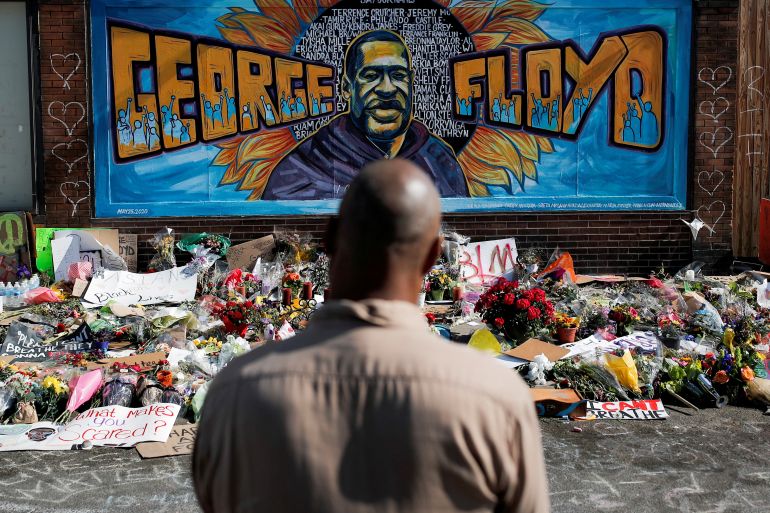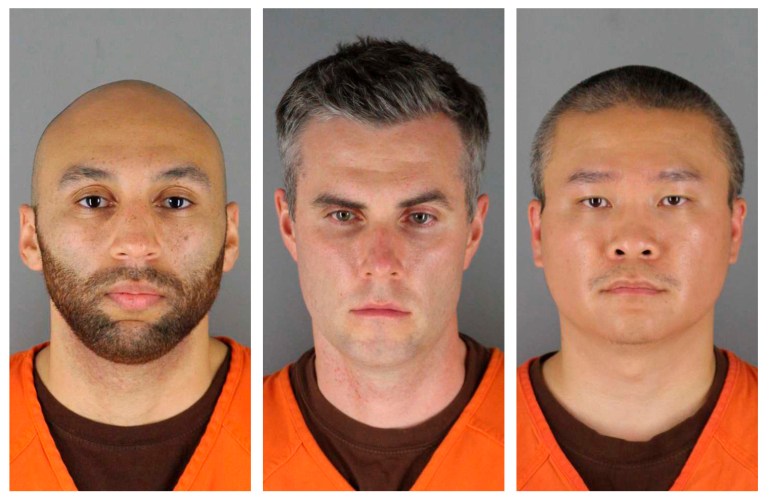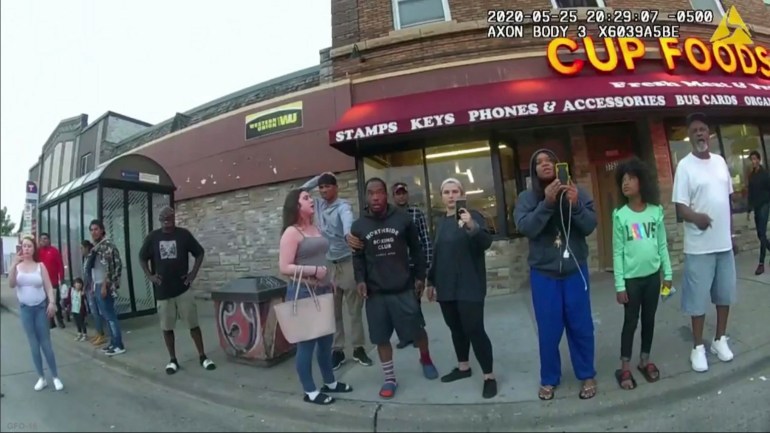Prosecutor: Officers ‘chose to do nothing’ as George Floyd died
The defence says Floyd’s death was a tragedy but that does not make it a crime.

Three police officers sat by and “chose to do nothing” when their colleague knelt on George Floyd’s neck leading to his death in Minneapolis, Minnesota in May 2020, a United States federal prosecutor said during closing arguments in their trial.
Prosecutor Manda Sertich on Tuesday singled out each of the former police officers — Tou Thao, J Alexander Kueng and Thomas Lane — as the government wrapped up its case in the monthlong trial. Kueng knelt on Floyd’s back, Thomas Lane held his legs and Tou Thao kept bystanders back.
Keep reading
list of 3 itemsIn wake of George Floyd, Minneapolis votes on replacing police
Chauvin pleads guilty to violating George Floyd’s civil rights
“They made the choice not to upset their colleague rather than do their duty, even though that choice resulted in the death of a human,” Sertich said.
“They chose to do nothing, and their choice resulted in Mr Floyd’s death,” she said.
A defence attorney at the trial called Floyd’s death a tragedy but said that does not make it a crime.
Robert Paule said during closing arguments that Thao thought officers at the scene were doing what was best for Floyd — holding him until paramedics arrived. And he says Thao did not willfully act “with a bad purpose or improper motive to disobey or disregard the law”.

All three pleaded not guilty to charges they willfully denied Floyd’s right to receive medical aid in police custody during the arrest, even as they had what Sertich called “front-row seats” to Floyd’s murder beside a police car parked in a Minneapolis intersection.
The trial comes after Derek Chauvin, 45, was sentenced to 22.5 years in prison after being convicted of Floyd’s murder at a separate state trial last year. Chauvin, who is white, knelt on Floyd’s neck for more than nine minutes as horrified onlookers begged the officers to check Floyd’s pulse.
The May 25, 2020 killing of Floyd, a 46-year-old Black man, while handcuffed triggered protests across the United States and lead to a reexamination of racism and policing.
The three officers’ federal trial in the district court in St Paul, Minnesota hinges on when an officer has a duty to intervene in a colleague’s misconduct, and has shone a light on a deeply hierarchical culture at police departments.
Thao and Kueng are also charged with willfully breaching Floyd’s civil rights by not intervening while their colleague knelt on his neck.
Sertich said Thao was captured on video choosing to “argue and mock” with the people on the sidewalk who were begging him to help Floyd rather than trying to get Chauvin off Floyd’s neck. Kueng, she said, could be seen smiling at a shared joke with Chauvin as Floyd died beneath them, and picking gravel out of a police car’s tire. Lane could be heard worrying that they should turn Floyd on his side but did not get up from pinning down Floyd’s legs.
She said the defendants did not do what “human decency and common sense required them to do: to stop the slow-motion killing unfolding right in front of them”.

Lane, who is white, Kueng, who is Black, and Thao, who is Hmong American, each testified in their own defence, saying they deferred to Chauvin’s many years of experience as the most senior officer on the scene. Lane and Kueng, who pinned down Floyd’s buttocks and legs as Thao stood nearby keeping onlookers on the sidewalk, have emphasised that they were rookies only a few days out of training.
Sertich said that even the rookies could and should have asked Chauvin to get off Floyd or to check his neck for a pulse.
Prosecutors have repeatedly drawn attention to the horrified bystanders on the sidewalk, most of whom had no medical training but correctly observed that Floyd had fallen unresponsive and screamed at officers to check Floyd’s pulse. Some appeared on the stand during the near three weeks of testimony.
Kueng can be heard in body-worn camera videos telling his colleagues twice that he cannot find a pulse. He told the jury he did not take from this that Floyd’s heart had stopped, but decided instead that the handcuffs were preventing him from checking the pulse successfully.
The defendants’ lawyers will deliver their own closing arguments before the jury begins deliberating. All three men face years in prison if convicted, and are also due to stand trial in a Minnesota court in June on state charges of aiding and abetting Floyd’s murder.